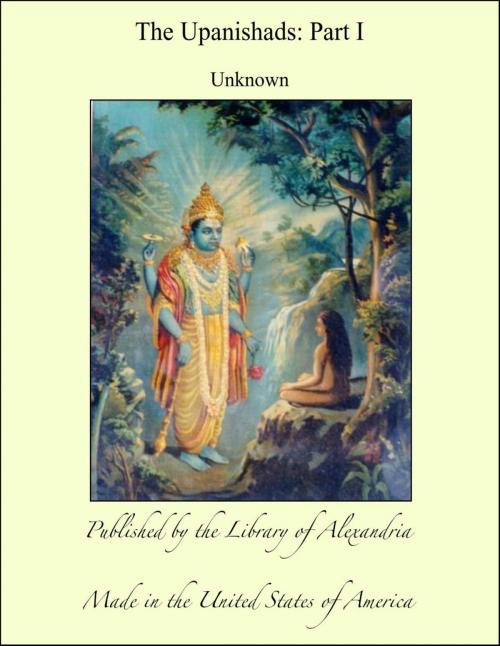| Author: | Unknown | ISBN: | 9781465573834 |
| Publisher: | Library of Alexandria | Publication: | March 8, 2015 |
| Imprint: | Language: | English |
| Author: | Unknown |
| ISBN: | 9781465573834 |
| Publisher: | Library of Alexandria |
| Publication: | March 8, 2015 |
| Imprint: | |
| Language: | English |
THE ancient Vedic literature, the foundation of the whole literature of India, which has been handed down in that country in an unbroken succession from the earliest times within the recollection of man to the present day, became known for the first time beyond the frontiers of India through the Upanishads. The Upanishads were translated from Sanskrit into Persian by, or, it may be, for Dârâ Shukoh, the eldest son of Shâh Jehân, an enlightened prince, who openly professed the liberal religious tenets of the great Emperor Akbar, and even wrote a book intended to reconcile the religious doctrines of Hindus and Mohammedans. He seems first to have heard of the Upanishads during his stay in Kashmir in 1640. He afterwards invited several Pandits from Benares to Delhi, who were to assist him in the work of translation. The translation was finished in 1657. Three years after the accomplishment of this work, in 1659, the prince was put to death by his brother Aurangzib1, in reality, no doubt, because he was the eldest son and legitimate successor of Shâh Jehân, but under the pretext that he was an infidel, and dangerous to the established religion of the empire. When the Upanishads had once been translated from Sanskrit into Persian, at that time the most widely read language of the East and understood likewise by many European scholars, they became generally accessible to all who took an interest in the religious literature of India. It is true that under Akbar's reign (1556-1586) similar translations had been prepared1, but neither those nor the translations of Dârâ Shukoh attracted the attention of European scholars till the year 1775. In that year Anquetil Duperron, the famous traveller and discoverer of the Zend-avesta, received one MS. of the Persian translation of the Upanishads, sent to him by M. Gentil, the French resident at the court of Shuja ud daula, and brought to France by M. Bernier. After receiving another MS., Anquetil Duperron collated the two, and translated the Persian translation2 into French (not published), and into Latin. That Latin translation was published in 1801 and 1802, under the title of 'Oupnek'hat, id est, Secretum tegendum: opus ipsa in India rarissimum, continens antiquam et arcanam, seu theologicam et philosophicam doctrinam, e quatuor sacris Indorum libris Rak baid, Djedjer baid, Sam baid, Athrban baid excerptam; ad verbum, e Persico idiomate, Samkreticis vocabulis intermixto, in Latinum conversum: Dissertationibus et Annotationibus difficiliora explanantibus, illustratum: studio et opera Anquetil Duperron, Indicopleustæ. Argentorati, typis et impensis fratrum Levrault, vol. i, 1801; vol. ii, 18023.
THE ancient Vedic literature, the foundation of the whole literature of India, which has been handed down in that country in an unbroken succession from the earliest times within the recollection of man to the present day, became known for the first time beyond the frontiers of India through the Upanishads. The Upanishads were translated from Sanskrit into Persian by, or, it may be, for Dârâ Shukoh, the eldest son of Shâh Jehân, an enlightened prince, who openly professed the liberal religious tenets of the great Emperor Akbar, and even wrote a book intended to reconcile the religious doctrines of Hindus and Mohammedans. He seems first to have heard of the Upanishads during his stay in Kashmir in 1640. He afterwards invited several Pandits from Benares to Delhi, who were to assist him in the work of translation. The translation was finished in 1657. Three years after the accomplishment of this work, in 1659, the prince was put to death by his brother Aurangzib1, in reality, no doubt, because he was the eldest son and legitimate successor of Shâh Jehân, but under the pretext that he was an infidel, and dangerous to the established religion of the empire. When the Upanishads had once been translated from Sanskrit into Persian, at that time the most widely read language of the East and understood likewise by many European scholars, they became generally accessible to all who took an interest in the religious literature of India. It is true that under Akbar's reign (1556-1586) similar translations had been prepared1, but neither those nor the translations of Dârâ Shukoh attracted the attention of European scholars till the year 1775. In that year Anquetil Duperron, the famous traveller and discoverer of the Zend-avesta, received one MS. of the Persian translation of the Upanishads, sent to him by M. Gentil, the French resident at the court of Shuja ud daula, and brought to France by M. Bernier. After receiving another MS., Anquetil Duperron collated the two, and translated the Persian translation2 into French (not published), and into Latin. That Latin translation was published in 1801 and 1802, under the title of 'Oupnek'hat, id est, Secretum tegendum: opus ipsa in India rarissimum, continens antiquam et arcanam, seu theologicam et philosophicam doctrinam, e quatuor sacris Indorum libris Rak baid, Djedjer baid, Sam baid, Athrban baid excerptam; ad verbum, e Persico idiomate, Samkreticis vocabulis intermixto, in Latinum conversum: Dissertationibus et Annotationibus difficiliora explanantibus, illustratum: studio et opera Anquetil Duperron, Indicopleustæ. Argentorati, typis et impensis fratrum Levrault, vol. i, 1801; vol. ii, 18023.















